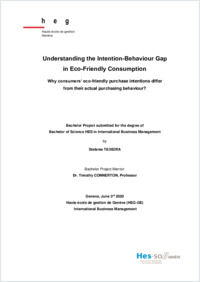Understanding the intention-behaviour gap in eco-friendly consumption : why consumers’ eco-friendly purchase intentions differ from their actual purchasing behaviour ?
SONAR|HES-SO
- Teixeira, Stefanie
- Connerton, Timothy (Degree supervisor)
-
2020
85 p.
Mémoire de bachelor: Haute école de gestion de Genève, 2020
English
Due to current global challenges, changes in consumer behaviour are required for an eco-friendly development based on responsible demand (Hirsch and Terlau, 2015). However, a difference between intentions towards eco-friendly consumption and actual behaviour has been observed (Hirsch and Terlau, 2015). For instance, 30% to 50% of consumers mentioned intend to purchase eco-friendly products, but in reality, only 3% actually purchase them (Carrington, Neville and Whitwell, 2010). Although consumers are becoming increasingly more motivated to purchase eco-friendly products, there might be specific purchasing barriers that make eco-friendly consumption difficult (Hirsch and Terlau, 2015). No concrete answers are provided concerning the reasons explaining the intention- behaviour gap for eco-friendly products (Hirsch and Terlau, 2015). Hence, this study aims at understanding what can cause inconsistencies between intentions and behaviour in eco-friendly consumption in the French-speaking part of Switzerland. The literature review will enable the reader to gain more knowledge regarding notions relevant to the eco-friendly consumer and products. Furthermore, existing models explaining the intention-behaviour gap phenomenon will be considered, in a manner to comprehend why intentions often fail to translate into behaviour. Additionally, factors having an influence in the decision-making process and encouraging pro- environmental behaviour will be analysed. The methodology will include quantitative as well as qualitative data. The online survey, with 120 answers, has provided information regarding people’s intentions and respective behaviour in eco-friendly consumption. Moreover, the focus group provided qualitative data in a way to obtain a broader range of information concerning individuals’ personal opinions on the topic. The data collection will enable to verify the veracity of assumption made by the literature regarding eco-friendly consumption, in the French-speaking part of Switzerland. This research will provide recommendations to firms selling eco-friendly products on how to reduce the intention-behaviour gap. These recommendations should allow for a better comprehension of the eco-friendly consumer, as well as help the consumer translate intentions into actual behaviour more effectively.
- Language
-
- English
- Classification
- Economics
- Notes
-
- Haute école de gestion Genève
- International Business Management
- hesso:hegge
- License
- License undefined
- Identifiers
-
- RERO DOC 329838
- Persistent URL
- https://folia.unifr.ch/global/documents/314958
Statistics
Document views: 433
File downloads:
- TBIBM_2020_TEIXEIRA_Stefanie.pdf: 1323
